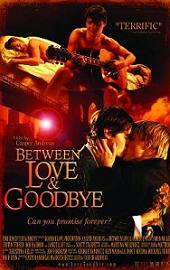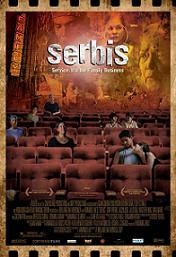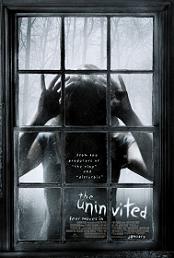Reviews for January 30th, 2009
Between Love & Goodbye
Directed by Casper Andreas.

After Marcel (Justin Tensen) flies in from France to get married to Sarah (Jane Elliott) in New York City, Marcel goes off to his musician boyfriend, Kyle (Simon Miller) and makes out with him. It turns out that Sarah’s a lesbian while Marcel and Kyle are both gay lovers and the only reason he and Sarah got married was so that he could get a green card. In a rather implausible scene, Kyle and Sarah go to the Department of Immigration to prove that they’re married and both of them struggle to answer certain questions seem uncomfortable during the interrogation, yet they’re somehow able to fool them. Just when Marcel moves into Kyle’s apartment, April (Rob Harmon), a transsexual prostitute, moves in as well. Will Kyle be able to give equal attention to both Marcel and April or will there be some sort of a conflict involving jealousy? Marcel clearly wants to spend more time with Kyle and thinks that April’s getting in the way, but the way he deals with his problem so aggressively and insultingly seems very immature and selfish to Kyle as well as to the audience. Soon enough, their relationship hangs on thin ice that could break any second. April has problems of her own when her body doesn’t accept her new breast implants, so she has them removed, shaves her head and decides to go back to being a man again. Despite a terrific ensemble cast that adds some much-needed energy to the film, writer/director Casper Andreas’ uneven, occasionally stilted screenplay falls somewhat flat in the romance, drama and comedy departments. On a positive note, Andreas includes a well-chosen soundtrack and smooth, stylish cinematography. The flashbacks showing how Kyle and Marcel had first met at a club, however, don’t help to give the audience a sense of why they’re truly in love with one another. What makes their connection beyond a physical attraction? Why do Marcel and Kyle behave so naïvely, especially when Kyle decides o distance himself away from him? It’s as though they’re both still stuck in their teenage years and haven’t learned how to listen attentively to one another, to compromise or to articulate their feelings respectfully for that matter. Their rudeness and jejuneness get on your nerves more often than not. Moreover, both of their actions in the third act feel out-of-character and make them quite unlikable. The only remaining character who remains likable and charismatic throughout happens to Sarah, but there aren’t enough scenes with her. Had she been the protagonist instead and with a more organic and witty screenplay, Between Love & Goodbye would have been much more engaging rather than often dull, contrived and unmoving. It also doesn’t help that its abrupt ending leaves you with a bad aftertaste. Number of times I checked my watch: 4. Released by Embrem Entertainment. Opens at the Clearview Chelsea Cinema.
The Class
Directed by Laurent Cantet.

In French with subtitles. Based on the book by François Bégaudeau. François Marin (François Bégaudeau) starts teaching a class about the French language to a diverse group of high school students at the beginning of the new school year. Those students include Carl (Carl Nanor), Arthur (Arthur Fogel), Esméralda (Esméralda Ouertani), Khoumba (Rachel Regulier), Wei (Wei Huang) and Souleymane (Franck Keita), among others. Each student has his or her interesting, complex personalities that slowly externalize so that they never really become stereotypes. Wei, for example, seems like a well-behaved and diligent student. Souleymane, who’s originally from Mali, and often causes trouble in class. Arthur feels like an outsider with his Goth style while Esméralda behaves stubbornly and annoys the teacher. There’s more to these students than meets the eye and it’s somewhat interesting to observe how they change or don’t change by the end of the school year. Co-writer/director Laurent Cantet shoots the film with a high definition digital camera in a cinéma vérité style that intentionally creates some chaos while creating a modicum of dramatic tension that arises from the interactions and dynamics between François and his students. Like the Chaos Theory predicts, there’s always some form of structure and order to be found within chaos, though. Admittedly, it takes a while to get absorbed into the film amidst all the chaos while getting to know the students. You’ll also find yourself relating to at least one of those students at some point. Occasionally, though, the interactions between them and the teacher feel repetitive and dull, especially because the majority of scenes take place inside the classroom for a long period of time. More comic relief would have helped to lighten some of the seriousness and to alleviate some of the blandness. Fortunately, though, there aren’t any scenes that feel forced or awkward. The most moving and captivating scene occurs when Souleymane’s mother shows up to an important meeting at school with her son. It’s very rare when you get to meet the parents of students in a high school drama, so when you briefly meet them in The Class, it makes the film even more realistic. While François Bégaudeau’s little experience on television in France along with his experience teaching in a high school, too, help to enhance his performance and make it convincing. The same can be said for the students who, despite not having any prior experience in acting, radiate an abundant amount of palpable energy and believable performances. At a running time of 128 minutes, The Class occasionally drags and overstays its welcome by roughly 30 minutes. While not as emotionally resonating and insightful as other classroom dramas such as Freedom Writers and To Be and to Haveor as captivating as Dangerous Minds, at least it’s mildly compelling, quietly moving and consistently true-to-life. Number of times I checked my watch: 3. Released by Sony Pictures Classics. Opens at the Angelika Film Center and Lincoln Plaza Cinemas.
Medicine for Melancholy
Directed by Barry Jenkins.

Micah (Wyatt Cenac) and Jo’ (Tracey Heggins), two African Americans living in San Francisco, wake up beside one another after a party the night before. Neither of them remembers how they ended up together and whether or not they had sexual intercourse. They decide to split a taxi on their separate way without speaking to each other. Jo’ appears to be disinterested in him and treats him coldly. He discovers her wallet in that she left in the cab and finds her license which has her old residence address. Through bit of fate and persistence, he finally knocks on her door to give her back the wallet, but not before coming into her apartment to get to know her a little more. It turns out that she has a boyfriend who’s currently working in London as a curator, although, Micah keenly observes that the walls of her apartment don’t have a single piece of art. When he inquires about her boyfriend’s race, she asks him why it even matters at all. Throughout the rest of the day, they ride their bicycle and walk around the city together while talking and gradually sparking a subtly palpable romantic chemistry with one another. Have they truly fallen in love or are they merely two human beings who enjoy spending time together and discussing provocative topics such as race? In his feature film debut as a writer/director, Barry Jenkins wisely allows the dialogue to flow organically so that you slowly get to know Micah and ‘Jo. They become real, complex characters. Sure, the plot feels minimalistic, but there’s a lot of warmth and tenderness to these two characters’ interactions with any pretentious or contrived moments. The city of San Francisco itself becomes a character throughout the film, especially when the Micah and Jo’ listen to a group of San Francisco residents who discuss the issue of gentrification. It’s quite refreshing to watch likable characters who also manage to be intelligent and mostly articulate about their thoughts and feelings, although neither Micah nor Jo’ are as open with one another as Harry and Sally are When Harry Met Sally…. Jenkins bathes the film in very washed-out colors that almost look like they’re black-and-white with sporadic bits of color, but eventually you become so immersed in the simply complex story that you forget that it’s not all in color. The lush cinematography along with the well-chosen soundtrack adds a very richly soothing atmosphere. At an ideal of running time of 87 minutes, Medicine for Melancholy manages to be a genuinely heartwarming, tender and wise slice-of-life that makes for a terrific , engrossing and refreshingly unpretentious date movie. Number of times I checked my watch: 0. Released by IFC Films. Opens at the IFC Center.
New in Town
Directed by Jonas Elmer.

Lucy Hill (Renée Zellweger), a tough executive who works for a corporation based in Miami, must move to New Ulm, a small town in Minnesota, in order to restructure a manufacturing plant located there. The workers at the plant assume that she’s going to fire them at some point no matter how many eloquent speeches she gives them. She first meets Blanche Gunderson (Siobhan Hogan), her quirky secretary who’s obsessed about her own tapioca recipe made out of low fat milk and whey protein, which may not be a healthy choice of ingredients (please click here to find out why). At the dinner table with Blanche and her friends and family, Lucy insults Ted Mitchell (Harry Connick, Jr.) when she expresses her honest opinion how sheltered and boring small-town life is compared to a big city where there’s lots of exciting culture and art, such as theater. Little does Lucy know that Ted happens to be the union representative of the manufacturing plant, so they don’t exactly start off on the right foot. Meanwhile, Stu (J.K. Simmons), the overweight foreman of the plant, detests her instantly and treats her quite coldly. Just when Lucy thinks she can head home for Thanksgiving vacation, a snowstorm strands her back in New Ulm. On her way back, her car skids and crashes into a snow pile as she tries to avoid hitting an animal on the road. Who comes to rescue her? Could it be Superman or perhaps Ted Mitchell? In a poorly developed subplot, Lucy inspires Ted’s teenage daughter to get a makeover and tries to loosen up her uptight, conservative father. Will she somehow manage to warm up to the townspeople and workers when the corporation tells her to shut down the plant or will she stay so insensitive and arrogant? Although the answer to this question ends up rather oversimplified and contrived, the variety of lively characters within the small town of New Ulm, as well as the town itself that becomes a character of its own, all add a bit of much-needed charm. You’ll find yourself gradually warming up to them like Lucy does as the film progresses. Co-writers Kenneth Rance and C. Jay Cox do a better job of creating interesting, specific and somewhat likable characters than moving the plot along in an imaginative and believable way. It’s actually a bit refreshing to watch a film set in a snowy town in the Midwest that doesn’t involve a murder taking place à la Fargo. Interestingly, though, Marge Gunderson, the quirky policewoman from Fargo played by Frances McDormand, has the same last name as Blanche does in New in Town. Unfortunately, much of the dialogue here feels bland and the comedy falls flat while Lucy and Ted have virtually no chemistry together onscreen. New in Town isn’t nearly as funny, smart or endearing as the superior Baby Boom, a 1987 film starring Diane Keaton which essentially treads the same water, but with a more plausible and compelling screenplay. However, director Jonas Elmer gives a breezy quality to the film. Its gently uplifting message about the importance of taking the time getting to know people openly and to tolerate outsiders makes New in Town feel mostly pleasant, harmless and big-hearted, yet, an ultimately forgettable drama. Number of times I checked my watch: 3. Released by Lionsgate.
Serbis
Directed by Brillante Mendoza.

In Filipino and Tagalog with subtitles. Nayda Pineda (Jaclyn Jose) works at a porn theater in the Philippines run by her family while her mother, Nanay Flor (Gina Pareño), the owner of the theater, deals with a lawsuit against her husband in divorce court. Nayda’s sister, Jewel (Roxanne Jordan), and cousins, Alan (Coco Martin) and Ronald (Kristofer King), can be found working at the theater in various jobs as well. Her husband, Lando (Julio Diaz), runs a cafeteria near the theater. Meanwhile, Merly (Mercedes Cabral) tells her boyfriend, Alan, that she’s pregnant and pressures him to get married. The theater’s patrons include gay prostitutes and hustlers, some of whom are transvestites. Although the plot’s setting inside a porn theater inevitably recalls the French film Porn Theatre, the plot in Serbis, which translates as “Service”, feels less engaging than that film. The dramatic tension lies in the family’s struggle to maintain the failing porn theater while dealing with each of their own personal problems. Unfortunately, screenwriter Armando Lao includes too many scenes that jump around between the family members without allowing you to feel absorbed enough by the events happen to them, which, in turn, makes it increasingly difficult to care about any of the characters or their problems, especially Nanay’s. Her courtroom troubles could easily be part of a separate film. The frank and occasionally pornographic nudity onscreen serves as a way to enhance the film’s reality and to avoid sugarcoating it. In a way, the viewer feels like a voyeur who’s merely watching the home videos of the Pineda family, especially given that director Brillante Mendoza shoots the film with a digital camera. However, without a protagonist and because none of the characters are particularly fleshed out enough, you ultimately feel a bit uncomfortable and desensitized as you observe them going about their daily and nightly activities at the theater. At running time of 90 minutes, Serbis often drags with too many poorly developed characters its convoluted, unfocused plot. If it were more character-driven and had a sharper screenplay, it would have been a much more captivating drama. Number of times I checked my watch: 5. Released by Regent Releasing/Here! Films. Opens at the Angelika Film Center.
Shadows
Directed by Milcho Manchevski.

In Macedonian with subtitles. Dr. Lazare Petrov (Borce Nacev), a young physician, gets into a car accident that has him dangling and seriously injured from his upside down vehicle. Miraculously, something or someone moves his body out of the car and onto pavement before the car collapses entirely, which would have killed him had he remained there. One year later, he still works as a physician and has mostly healed from his injuries. He leaves his wife (Filareta Atanasova) and son there while he returns to his apartment in the city of Skopje, Macedonia. At that point, the film’s suspense aspects escalate as Dr. Petrov finds an elderly woman (Ratka Radmanovic) sitting on his sofa and talking in a strange language that he isn’t able to understand. When he drops a glass of milk, she attempts clean up the mess before he throws her out. He tape records what she says to him and consults a professor at a university to translate it. Instead, he meets Menka (Vesna Stanojevska), who claims to be the professor’s assistant, to have a husband and translates what the old woman whispered to him: “Return what’s not yours. Have respect.” What does the old woman want him to return? How did she manage to break into his home? Why does the tape recording of her voice become mysteriously erased? Why does Dr. Petrov continue to see strange apparitions? What does it all have to do with his car crash and the miraculous event that saved his life? Writer/director Milcho Manchevski, who had also directed Before the Rain and Dust, doesn’t rely on gore or shock value as a means to provide scares and to answer those compelling questions. Instead, he creates an increasingly foreboding and creepy atmosphere that’s filled with stylish cinematography, a terrific musical score, mystery and intricate, seemingly unimportant details which make more sense in retrospect once the third act’s nail-biting revelations come around. None of the surprises or twists will be revealed here, though, but it’s worth noting that the relationship between Dr. Petrov and his overbearing mother (Dime Ilijev) becomes more dramatically intense and that he develops a tender romance with Menka and opens up to her emotionally more than he does to his own wife, who’s still on vacation. At a running time of 2 hours, Shadows manages to be a hauntingly frightening, clever and surprisingly poignant psychological horror film. Number of times I checked my watch: 1. Released by Mitropoulos Films. Opens at the Cinema Village.
Taken
Directed by Pierre Morel.

Bryan Mills (Liam Neeson), an ex-CIA agent, lives in Los Angeles separately from his ex-wife, Lenore (Famke Janssen), and estranged, 17-year-old daughter, Kim (Maggie Grace), who dreams of becoming a singer. The first act has Bryan showing off skills as a bodyguard of popular singer, Sheerah (Holly Valance), whose life he boldly saves at concert when attackers barge in and try to kill her. With pressure from his ex-wife, he reluctantly allows Kim to go on a trip to Paris with her friends and reminds her to call him frequently to make sure that she’s safe and sound. He only finds out at the airport that the trip to Paris is actually part of a trip around Europe while following the band U2. As Kim and her friend, Amanda (Katie Cassidy, arrive in Paris, a young, seemingly charming man shares a taxi with them to their apartment and invites them to a party, which they agree to attend. They even naïvely give him their exact location at the apartment. Soon enough, two men kidnap Amanda and Kim while Kim’s on the phone with her father. He travels all the way to Paris on a private jet. When he learns that the voice he heard on the phone with Kim that said, “Good luck,” belongs to Marko (Arben Bajraktaraj), the leader of an Albanian gang involved in the sex trade business, he realizes that he has 96 hours to find his beloved daughter. Once he goes to the apartment and finds the memory chip of her camera phone which has evidence of her kidnapping, that’s when the plot picks up its momentum. The plot slightly thickens and becomes intense as he gets closer and closer to finding Kim. What makes it even more complicated for him is that Kim’s kidnapping involves corruption within the French government. Fortunately, Liam Neeson sinks his teeth into his role of Bryan Mills with ease. He delivers a convincingly charismatic and solid performance that allows you to root for him even while he uses aggressive force, such as electric shock torture, to get what he wants. The screenplay by co-writers Luc Besson and Robert Mark Kamen does follow a formulaic structure, but at least it follows it in a compelling way without deviating too much from the action/thriller genre. Admittedly, though, it does take some liberties when it comes to how easily Bruce avoids getting killed or arrested, so often the action scenes lack plausibility. At least director Pierre Morel does a great job of blending just enough exhilarating action sequences, thrills and brief comic relief along with a brisk pace which make for a thrilling, taut and purely escapist ride, as long as you’re willing to check your brain at the door and suspend a lot of disbelief for 93 minutes. Number of times I checked my watch: 1. Released by 20th Century Fox.
The Uninvited
Directed by Charles and Thomas Guard.

Anna Rydell (Emily Browning) leaves a mental institution where she has spent a while at because she attempted suicide after her ill mother had died in an accidental house fire. Upon her arrival at a beautiful house alongs the ocean, she reunites with her father, Steven (David Strathairn) and sister, Alex (Arielle Kebbel) while meeting Rachel (Elizabeth Banks), Steven’s sexy girlfriend whom she has never met before. That’s around the time when she begins to see visions of dead people, such as her own mother, pop out of nowhere or crawl out from under her bed. Is she just plain delusional or are those apparitions truly there? If so, then what do they want from her? The answer to those questions may or may not have something to with how suspicious Rachel seems in terms of her behavior toward Anna and Alex, especially when they confront her about her shady past. Something sinister might have occurred when Matt (Jesse Moss), Anna’s ex-boyfriend, “accidentally” drowns after crashing his small boat at night, which happens to be around the same time when he showed up unexpectedly in Anna’s room. The screenplay by co-writers, Craig Rosenberg, Doug Miro and Carlo Bernard, based on the Korean film A Tale of Two Sisters written by Kim Jee-woon, includes too many dim-witted, boring characters who you often laugh atrather than laugh with, although, admittedly, Anna and Alex both look quite easy on the eyes, especially in a bikini. One of the characters, who won’t be revealed here, hides poison in a location that doesn’t make it difficult enough to find. Meanwhile, Steven seems oblivious to what's going on with Rachel, unless he's too seduced by her to realize anything. The co-writers also include an excess of foreshadows and red herrings that just hit you over the head with virtually no subtlety. For example, there are at least two scenes that transition to the loud chopping of raw meat. Too much of the film feels as though it’s merely treading water until the “gotcha!”, gimmicky and silly ending that defies logic and reason. Truly satisfying and shocking endings are those that make sense in hindsight so that you're able to put all the pieces together in a different way than you had originally thought of. In this case, the pieces simply don’t come together and leave a lot of plot holes along the way, which make the screenplay's laziness even more radiant. On a positive note, co-directors Charles and Thomas Guard, a.k.a. The Guard Brothers, include plenty of eye candy when it comes to the bright, picturesque settings which contrasts nicely from the dark, foreboding evil that both Anna and Alex believe they have come in contact with. It's also worth noting that there's sign of a Jewish exorcist who shows up to perform an exorcism while unintentionally spoofing the Hebrew language like the Gary Oldman character in the recent PG-13 horror film, The Unborn. If only The Uninvited had a more intelligent screenplay with smarter characters, more real scares and less reliance on cheap gimmickry as a means of entertainment, it wouldn’t feel so vapid, illogical and underwhelming. Number of times I checked my watch: 3. Released by Paramount Pictures.
Main Page
Alphabetical Menu
Chronological Menu
______________________________________________________
|








